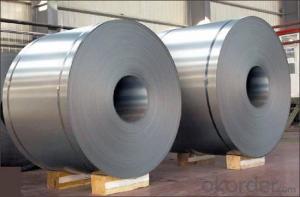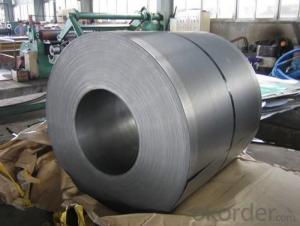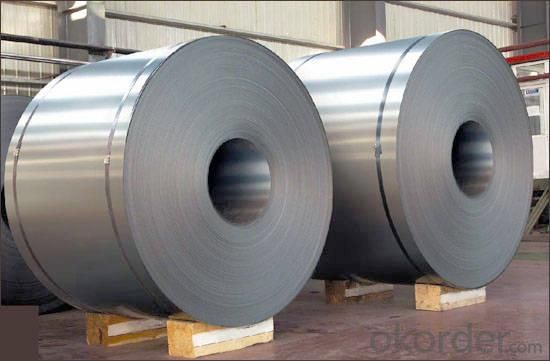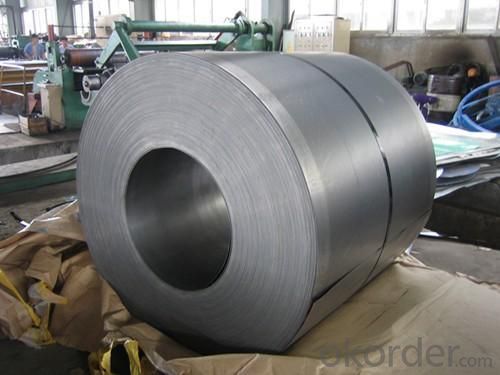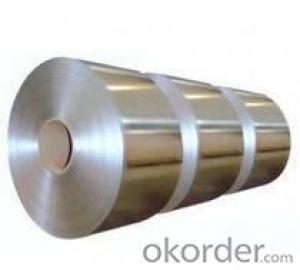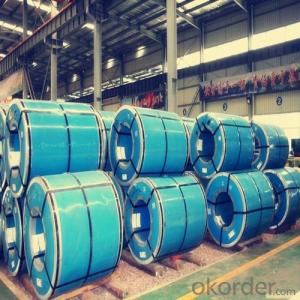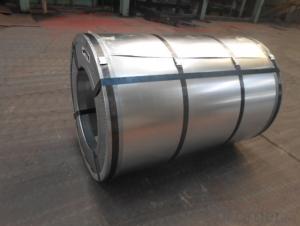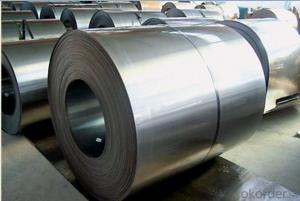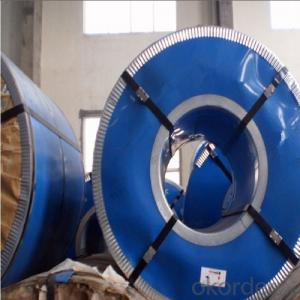cold rolled steel coil with competetive price
- Loading Port:
- Tianjin
- Payment Terms:
- TT OR LC
- Min Order Qty:
- 1000 m.t.
- Supply Capability:
- 10000 m.t./month
OKorder Service Pledge
OKorder Financial Service
You Might Also Like
Quick Details
Standard: ASTM, DIN, GB
Steel Grade: Q235B
Place of Origin: Hebei, China (Mainland)
Technique: Hot Rolled
Surface Treatment: Polished
- Technique: Cold Rolled
Surface Treatment: Coated
Packaging & Delivery
| Packaging Details: | in bundle |
|---|---|
| Delivery Detail: | 25 days after receiving the deposit |
Specifications
Hot rolled sheet in coil: Specification 2.0mm-15.5mm;
Material: Q235, SS400, SPHC, 16Mn, 16MnR, 20G, 65Mn.
Sales of the steel products
1. Steel pipes
(1) Seamless steel pipe: material 20#, 45#, 16Mn; Specification dia:57mm-dia:630mm.
(2) High-frequency welded pipe: material Q235A/B; Specification dia:15mm-dia:159mm.
(3) Galvanized pipe: material Q235A/B; Specification dia:15mm-dia:80mm.
(4) Stainless steel pipe: material 304, 316, 321, 430; Specification dia:15mm-dia:159mm.
(5) Cast iron pipe: material is spherulitic graphite cast iron, 18#, 22# pig iron.
2. Steel plate
(1) Cold rolled sheet in coil, cold rolled sheet in box: Specification 0.4mm-3.0mm; Material: ST12, SS400, SPHC.
(2) Hot rolled sheet in coil: Specification 2.0mm-15.5mm;
Material: Q235, SS400, SPHC, 16Mn, 16MnR, 20G, 65Mn.
(3) Medium plate: Specification 8.0mm-100mm; Material Q235, 65Mn, 16MnL.
(4) Galvanized sheet: Specification 0.4mm-3.0mm
(5) Stainless steel sheet: Specification 0.3mm-2.0mm; Material 304, 316, 321, 430.
- Q: In construction, what types of stress require steel to be placed in footings?
- Steel is always added to concrete to handle local 'tension' stresses. (Sometimes to provide extra compression in 'pre-stressed' applications, but the steel is still in tension.) Steel would be added to the lower section of footings to stiffen them to 'bridge' local 'soft spots' in the substrate.
- Q: How are steel coils used in the production of storage shelves?
- Steel coils are an essential component in the production of storage shelves. These coils are typically made from carbon steel and undergo a series of processes to shape them into the desired form. The first step in using steel coils for storage shelves is to unroll and flatten the coil. This is done using a machine called a decoiler, which unwinds the coil and feeds it through a series of rollers to flatten the metal. Once the coil is flattened, it is ready for further processing. Next, the flattened steel is cut into specific lengths using a shearing machine or a saw. These cut pieces are then bent and shaped into the appropriate dimensions for the storage shelves. This bending process is typically done using a press brake or a roll former, which applies pressure to the metal to create the desired shape. Once the steel has been shaped into the proper dimensions, it is welded together to form the structure of the storage shelf. This welding process ensures that the shelves are strong and durable, capable of supporting heavy loads. After the welding is complete, the storage shelves may undergo additional processes such as surface treatment or coating to enhance their appearance and protect them from corrosion. These treatments can include processes like powder coating, galvanization, or painting. Overall, steel coils play a crucial role in the production of storage shelves. They provide the raw material from which the shelves are made, and their versatility allows for a wide range of shapes and sizes to be created. The strength and durability of steel make it an ideal choice for storage shelves, ensuring that they can withstand heavy loads and provide long-lasting storage solutions.
- Q: How can I tell the wear resistance, strength, ect from the name of the steel?how could I tell the difference between 420 and 440 steel. what does the HC in 420 HC steel mean? what do the numbers and letters in s30v steel mean?
- Larry gave a good answer. As for the HC, it means High Carbon.
- Q: I am doing an assignment for my materials class, im not asking for the answer but just some help. I have the assignment finished and handed in but the teacher gave it back with one comment, he asked me to explain the grain growth in steel during hydraulic press bending. Im completely stuck, please help. Thanks.
- Well, I can't answer the question for you because, if the press bending is done cold, the grains will not grow (at least not with normal steel alloys). One wonderful thing about metallurgy is that the real answer is it depends because there are all sorts of weird and unexpected things that can happen. Cold work (which is what press bending is unless it is done hot or the amount of deformation is extraordinary high and fast so the metal heats up a lot locally) adds stored energy (strain energy) which provides one of the driving forces for recrystallization. Recrystallization is not a yes/no process, it is a process that happens as a function of time and temperature. Recrysallization of a cold worked structure will refine the grain size if done properly but the final stage of recrystallization is grain growth and you can end up with a larger grain size than you started with. The other thing that can affect grain structure is the deformation itself. There are all sorts of transformations that can happen due to the deformation process (twinning/martensitic is one) but, again, these don't usually qualify as grain growth. It may be that the question was incomplete, maybe the question is how does the press bending affect the final grain size after a subsequent anneal? The metallurgy of steels is fascinating because there are so many different microstructures that can be produced, hundreds (or thousand) different alloys, equilibrium and non-equilibrium phases based on composition and thermo-mechanical processing. Hope this helps
- Q: How are steel coils used in the manufacturing of elevator components?
- Steel coils are used in the manufacturing of elevator components as they provide the raw material for producing various parts such as brackets, frames, and structural supports. These coils are processed through cutting, bending, and shaping techniques to create the necessary components that ensure the safe and efficient operation of elevators.
- Q: Can steel coils be used in architectural applications?
- Yes, steel coils can be used in architectural applications. Steel coils are versatile and can be processed into various shapes and forms to meet the unique design requirements of architectural projects. They can be used in the construction of buildings, bridges, and other structures, as well as in the fabrication of architectural elements such as roofing, cladding, and facades. Steel coils offer several advantages in architectural applications. They are highly durable, strong, and resistant to corrosion, making them suitable for long-lasting and low-maintenance structures. Steel coils can also be customized in terms of thickness, width, and surface finish, allowing architects to achieve their desired aesthetic and functional goals. In addition, steel coils are known for their structural stability and load-bearing capacity, which are crucial factors in architectural designs. Their high strength-to-weight ratio makes them an ideal choice for creating large and open interior spaces, as well as for supporting heavy loads in multi-story buildings. Furthermore, steel coils can be easily fabricated and installed, saving time and labor costs during construction. They can be efficiently formed, cut, and welded to create complex shapes or architectural details. Moreover, steel coils can be pre-fabricated off-site, ensuring precision and quality control, and then assembled on-site, reducing construction time and minimizing disruptions to the surrounding environment. Overall, steel coils offer architects and designers a wide range of possibilities in architectural applications. Whether it is for structural support, aesthetic appeal, or functional requirements, steel coils provide a reliable and versatile material option that can meet the demands of modern architectural projects.
- Q: How are steel coils packaged for shipment?
- Steel coils are typically packaged for shipment by being tightly wound and secured with steel bands or straps. They are often placed on wooden skids or pallets to provide stability and protection during transportation. Additionally, protective covers or sheets may be used to shield the coils from moisture and other potential damages.
- Q: How are steel coils used in the manufacturing of flooring materials?
- Steel coils are commonly used in the manufacturing of flooring materials as they provide structural support and durability. The steel coils are typically used as a base layer that is sandwiched between other materials, such as wood or vinyl, to create a strong and sturdy flooring surface. The coils help to distribute weight evenly and prevent the flooring from sagging or warping over time. Additionally, the steel coils can also enhance the impact resistance and overall lifespan of the flooring, making it suitable for high-traffic areas.
- Q: so my parents gave me stainless steel cookware for christmas and the first time i used it i cooked chicken. it stuck to the pan and where the oil splattered it cooked on and turned it dark black and brownish. and the bottom too. i don't cook with it because i don't want to burn it on anymore but i don't know how to clean it. how do i cook without burning anything, aside from a lower flame and how on earth do i get the stains on. i've tried almost everything too! thanks.
- Dear pwrgrlmanda, I also use stainless steel. I have found the best way to clean any cookware that has food baked or cooked on it is by filling my sink with the hottest water possible, submerging the entire piece of cookware in the sink and then liberally sprinkling cascade powder over the top. Allow it to set overnight and usually in the morning everything will come off with a nylon scrubber. It really works! No more elbow grease. This also works for corning ware, glass baking pans, cookie sheets etc. Hope it works for you.
- Q: What kind of insulation should be used in a steel building?
- Vinyl fiberglass insulation is getting popular with the steel building industry. The vinyl fiberglass insulation offers a shining look to the building and is resistant to dust as well as condensation. Effective ventilation inside the steel building can also help in preventing the condensation process inside the building. Besides, the building doors should be insulated effectively so as to minimize the heat loss. Be sure to seal all the door gaps in the building. All these steps are necessary to follow to get an effectively insulated steel building.
Send your message to us
cold rolled steel coil with competetive price
- Loading Port:
- Tianjin
- Payment Terms:
- TT OR LC
- Min Order Qty:
- 1000 m.t.
- Supply Capability:
- 10000 m.t./month
OKorder Service Pledge
OKorder Financial Service
Similar products
Hot products
Hot Searches
Related keywords
